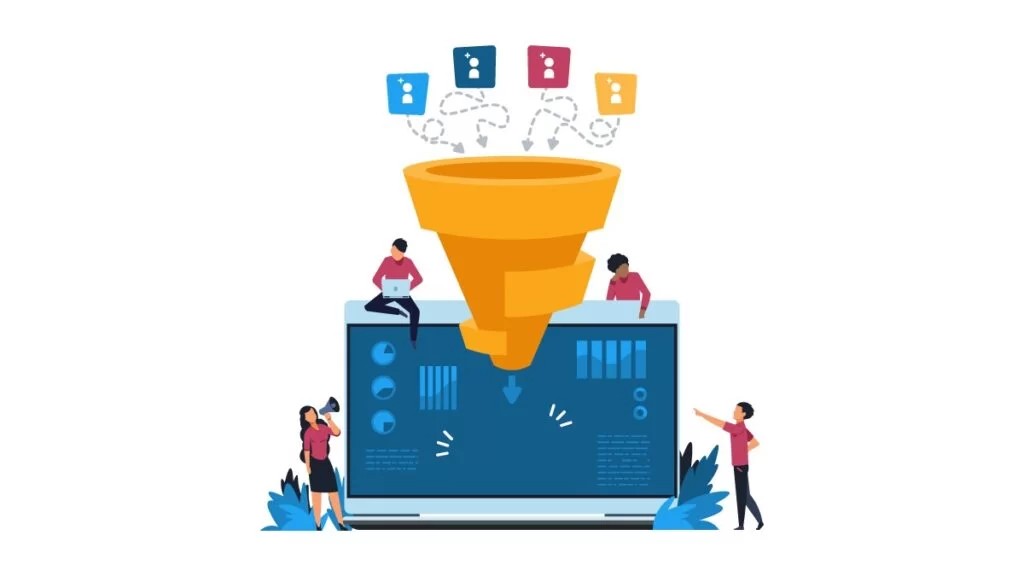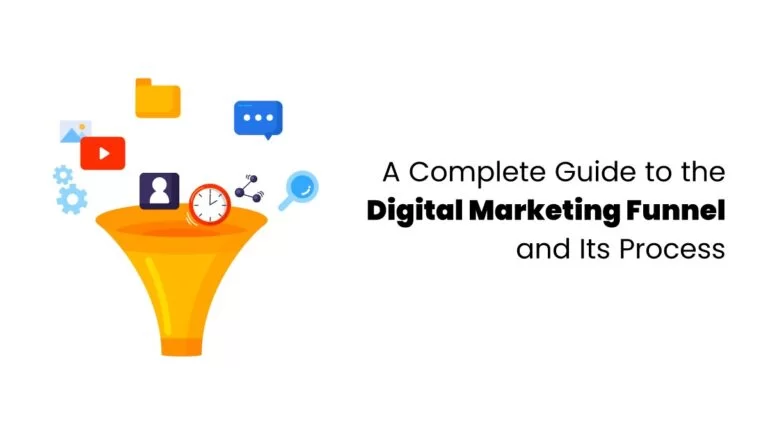Nowadays, the method of online purchasing has changed a lot . In earlier times, when we saw a product, we would not compare it with others. But now, many platforms are available online. Once you see an ad, you may neglect it; again, when you see it later, you may open it and see the product, and an interest slowly begins to form in your mind. You will start gathering information about it on Google and show interest in reading its reviews across different platforms. Then you will add it to the cart but will not buy it due to an unexpected distraction. Days later, you will return for that product and buy it. This whole process is called a funnel by marketers.
Understanding Digital Marketing Funnel
A digital marketing funnel is the pathway a customer follows to purchase a product. When we talk about what a digital marketing funnel is, we are simply describing how this buying process moves through different steps. It is the buyer’s journey as he first becomes aware of the brand, searches for it, visits its website, looks for its product, and finally buys it.
A digital marketing funnel consists of phases and processes designed to achieve this goal through various strategies. In short, it is a complete demonstration of a customer’s purchasing journey.
Awareness: Customer became aware of the brand online for the first time. They may have seen this brand in an Instagram or YouTube ad, or while searching for an answer and found it in a blog or another method. Here is the customer’s exciting moment as they discover a new brand. Most importantly, they became aware of your brand for the first time. This is the hardest milestone ever to achieve in the case of brands.
Interest: Now, they are curious. They will tap your ad, check your website, and even sign up for your newsletter to see what you offer. At this stage, they will not compare; they will try to understand your products.
Consideration: Here, they will become more serious, they will start comparing, reading reviews, and watching your demo videos. They will analyse whether your brand is the perfect solution for their problem.
Conversion: Here, they will perform an action such as placing an order, scheduling a call, joining your program, or subscribing to your service. They finally decided to choose your product.
Retention: Retaining customers even after a single purchase is an important step. If your brand forgets to do so, you are losing one of the valuable customers you could ever get. Keep the relationship alive by providing helpful emails and new updates. So there is a chance that the customer will come back for your service.
Advocacy: Your happiest customers will turn into your loudest promoters. They will write good reviews about you. They will recommend your product to others. Their voice will become a powerful asset for your brand.
Various Examples Of Digital Marketing Funnel
Now you have a clear idea about what is digital marketing funnel is. The best way to see a digital marketing funnel is through real-world examples. There are 2 examples mentioned below:
1. Notion’s Digital marketing Funnel Example
Notion’s Funnel blends simplicity and personalization to turn users into advocates.
In the awareness stage, Notion becomes famous through social media posts, workspace tour videos, etc. These small moments make people aware that it is a modern tool for organizing work.
In the discovery stage, Notion offers beginner tutorials and simple guides on its website and YouTube channel to help people understand its core use.
In the consideration stage, Notion supports interested users with team demo videos, free plans and shared videos. They will also show customers ready-to-use templates for different needs.
In the conversion stage, Notion shows customers gentle upgrade reminders, discounts for teams. They will also ensure that the sign-up process is simpler for the customers.
In the retention stage, Notion keeps users active with monthly new features and attractive emails to retain the customer for future repeated purchases.
2. Blinkit Marketing Funnel Example
Another example of a digital marketing funnel is Blinkit. Let’s check its several stages in detail in this digital marketing funnel guide.
In the awareness stage, Blinkit promotes itself using short, funny ads on Instagram. Their 10-minute delivery message makes the brand easier to remember, especially in cities.
In the discovery stage, when people search for quick groceries, Blinkit shows up on Google, Google Maps, the App Store, etc. Customer reviews also help it understand how fast and easy its service is.
In the consideration Stage, Blinkit will build trust with its customers by showing clear delivery times, store ratings, live order tracking and simple return options.
In the conversion stage, Blinkit will give access to many payment options and first-order discounts. They will also send messages such as “Order in the next 4 minutes for fastest delivery” to lure customers into the buying process.
In the retention stage, Blinkit will encourage its customers to return and buy more by offering festival deals, weekly offers, free delivery options, etc.

What is The Importance of A Digital Marketing Funnel?
The digital marketing funnel is important due to the following reasons.
Clear Customer Groups
A digital marketing funnel helps you divide your audience into smaller groups. This will enable you to share the right content with the right customer in their buying journey.
More Quality Leads
When you market your product with a clear objective, you will get more high-quality leads. The specialty of this leads is that they know your brand well, thereby making conversions smoother.
Smarter Use of Time and Effort
This digital marketing funnel saves you a lot of time and effort, as you create content that truly works. Use your time smartly to make your business profitable.
Building a digital marketing funnel is essential for any business. It helps a stranger convert into your loyal customer forever.
How to Design a High-Impact Digital Marketing Funnel for Your Brand?
It is better to follow these steps to create a high-impact digital marketing funnel for your brand, especially once you understand what is digital marketing funnel.
Understand Your Audience and Competitors: Keep looking for your target audience. Study your competitors to see what works, what does not, and how you can stand out.
Set Clear Goals and Plan Actions: You have to pre-decide what actions your customers should take. Set timelines to achieve these goals effectively.
Develop a Comprehensive Content Strategy: Include guides, case studies, videos, testimonials, cheat sheets, and webinars to educate, engage, and persuade your audience.
Design Your Website and Landing Pages for Conversions: Ensure your website design is strong and your landing pages are visually appealing. Also, make sure that they contain clear calls to action, security badges, forms, and testimonials to capture leads effectively.
Run and Optimize Campaigns: Use SEO, social media, email marketing, paid advertising, and influencer collaborations to deliver relevant, unbiased content. Perform A/B testing, track analytics, and continuously adjust your campaigns to improve performance.
Build Loyalty and Strengthen Your Brand: Automate follow-ups with helpful tips, product recommendations, and offers. Use these methods to create trust and long-term engagement.
Limitations of a digital marketing Funnel
In this digital marketing funnel guide, we are also going to discuss its limitations:
- It assumes a straight path, but in reality, customers often skip steps or go back and forth, so it does not always match real behavior.
- It focuses mainly on pre-sale activities and gives insufficient attention to post-sale support, loyalty, and repeat purchases.
- Tracking which actions lead to results is difficult because customers use multiple devices and channels.
- More traffic does not always mean better results if the audience is not the right fit.
- Funnels can overlook parts of the customer journey, limiting understanding of long-term engagement.
- To get a complete picture, you need additional approaches, such as customer journey mapping or lifecycle marketing.
Conclusion
The digital marketing funnel is like a roadmap for your customers. It shows how people discover your brand, learn more about it, and decide to buy. By creating the right content at each step, first to catch attention, then to explain your value, and finally to inspire action, you can connect better, earn trust, and make more sales. A smart funnel helps you reach the right people, save time, and grow your business smoothly, and you can understand this even better when you learn it in a course on digital marketing in Calicut.
FAQs
1. What is a digital marketing funnel?
It is a step-by-step process that takes potential customers from learning about your brand to making a purchase.
2. Why is a marketing funnel important?
It helps target the right audience, nurture leads effectively, and improve conversion rates.
3. What are the main stages of the funnel?
Awareness, consideration, and conversion are the three main stages of a digital marketing funnel.
4. How can I create an effective funnel?
By understanding your audience, providing useful content, designing smooth buying experiences, and continuously analyzing results.
5. Can a funnel help with repeat sales?
Yes, by adding follow-ups, personalized recommendations, and loyalty strategies, a funnel can turn one-time buyers into repeat customers.










